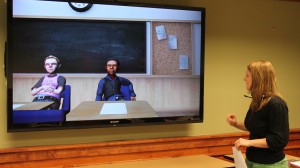
Kate Walker, a junior elementary education major at the University of Mississippi, addresses a TeachLive avatar during a practice lesson in the TeachLive virtual classroom at the UM School of Education. Photo by Andrew Abernathy.
OXFORD, Miss. – For most educators, student teaching is a sink-or-swim experience combining theory and practice. But at the University of Mississippi, pre-service teachers are using the latest technology to get a head start on this phase of training with a virtual classroom program called TeachLive.
The UM School of Education, the state’s largest producer of teachers and educational leaders, is among 19 institutions across the country chosen to pilot this training program designed by faculty at the University of Central Florida.
“For the first time, our students can actually teach a lesson, learn and gain experience before entering the classroom,” said UM education Dean David Rock. “That is not just innovative, that’s what practice teaching is all about. They can make mistakes and learn without impacting children.”
While teaching, pre-service teachers navigate a physical classroom at UM equipped with a position sensor, which move them through a classroom displayed on a monitor. They communicate with five distinct student avatars – each programmed by the TeachLive team to behave like middle school children. The avatars fall asleep, send text messages or cause other distractions. Hidden inside avatar personalities can be warning signs of underlying issues such as learning disabilities or abuse at home, allowing UM students the chance to identify these signs in their practice.
“It’s a great way to get the nerves out of your system before you actually enter a real classroom,” said Erin Simpson, a junior elementary education major from Gulfport. “If you mess up, it doesn’t affect a real child and when you learn from your mistakes, you’re that much more confident.”
The School of Education has utilized the program since fall 2012 and plans on expanding its use among undergraduates in the future, including possibly opening TeachLive classrooms at the university’s DeSoto and Tupelo regional campuses. Current junior education majors get a chance to use the virtual classroom twice a semester. Following each 30-minute session, an experienced educator evaluates the students’ lesson and leadership style.
“It gives them a chance to actually get in front of what seems like real people and interact with children,” said Larry Christman, a veteran Mississippi principal and UM adjunct professor of education. “There are five different personalities on the screen, and they are going to see these personalities when they get out in the real world.”
Remote operators at UCF can control elements of the classroom such as noise levels and avatars’ moods and responses to questions. The avatars can be unruly, insightful or shy, and are designed to give aspiring educators a chance to gain experience teaching in a variety of subject areas.
“Instead of being afraid of messing up, I’m able to see what teaching is like,” said Natalie Vermillion, a junior elementary education major from Austin, Texas. “Because if I make a mistake in an actual classroom, I’m wasting students’ time. But these students are here for us to practice, so it makes me more comfortable and able to learn from mistakes.”
For more information visit the TeachLive program.